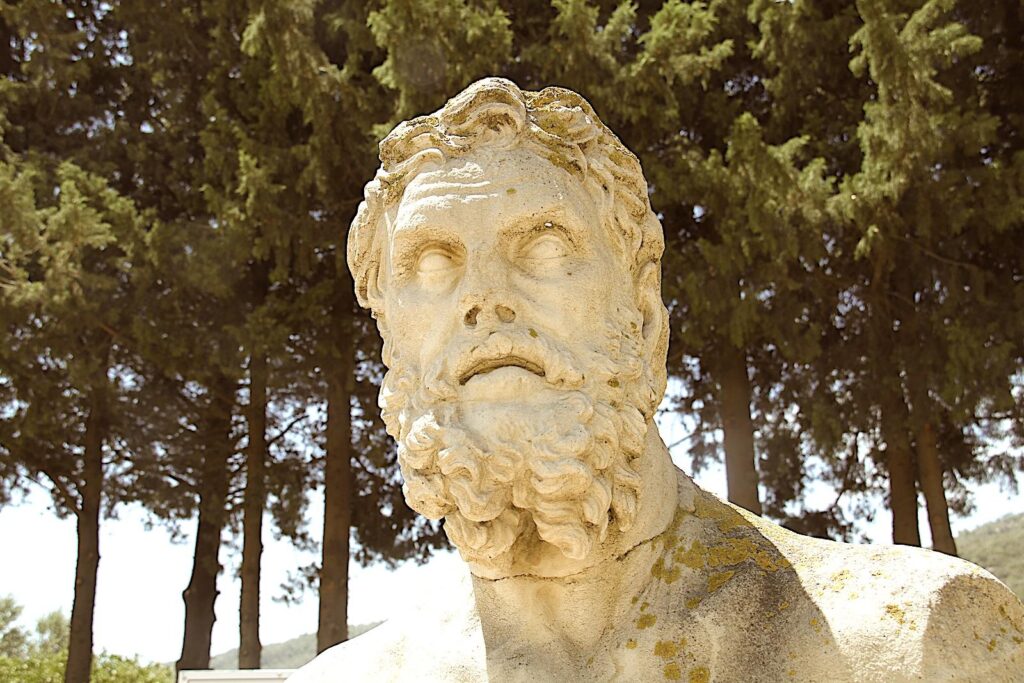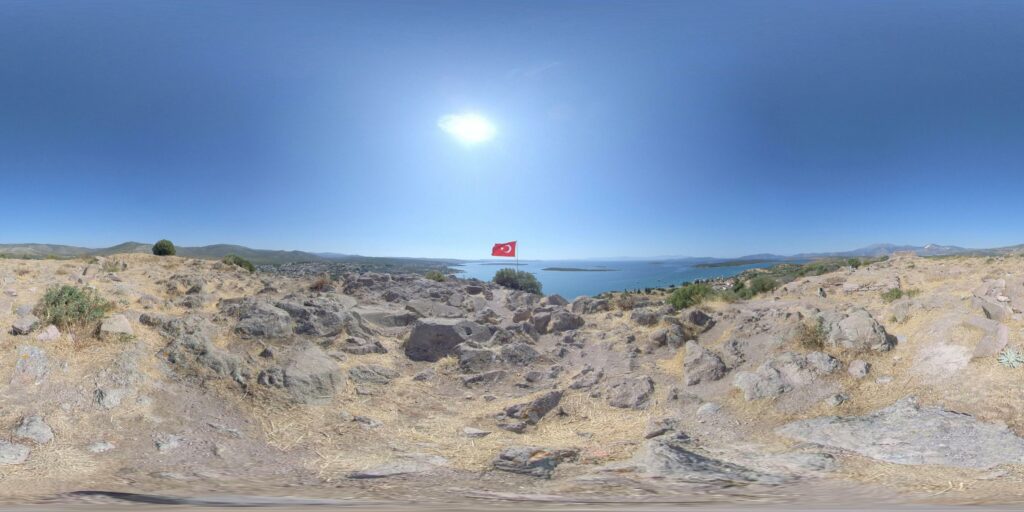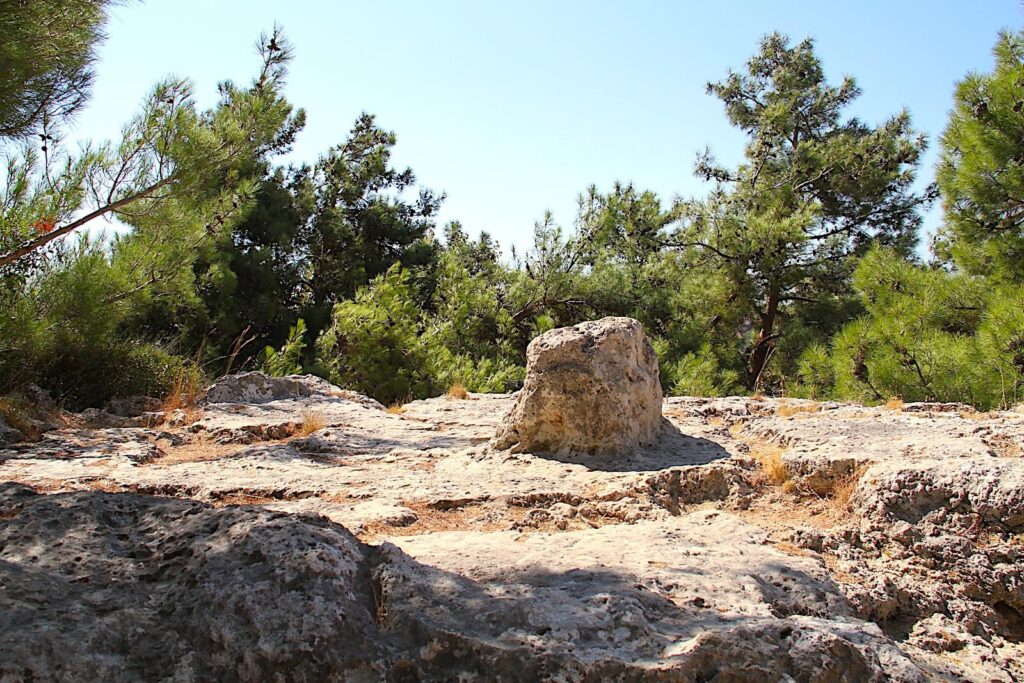Homer, the legendary ancient Greek poet traditionally attributed as the author of the Iliad and the Odyssey, is closely associated with the region around Çeşme and its surrounding area, particularly İzmir (ancient Smyrna), which is just 85 km east of Çeşme. This connection stems from the region’s historical, geographical, and cultural traditions.
While Çeşme is not directly mentioned in Homeric literature, its proximity to Smyrna (a claimed birthplace of Homer), its ties to the Ionian League, and its shared culture with neighbouring Chios firmly link it to Homer’s legacy. The region’s maritime and cultural history undoubtedly provided a setting that could have inspired the epic tales that have shaped Western literature.
Homer – Table of Contents

İzmir the Birthplace of Homer?
The ancient city of Smyrna (modern İzmir), near Çeşme, is one of several cities that claim to be Homer’s birthplace. Smyrna was a crucial Ionian city and part of the Ionian League. While there is no definitive evidence about Homer’s precise birthplace, Smyrna’s claim is supported by ancient sources like the geographer Strabo, who mentioned Homer’s connection to the area. Other prominent Ionian cities like Erythrae (modern Ildırı, 25km east of Çeşme) further link the poet to the Aegean coast.
Seven cities that claim to be the birthplace of Homer:
| City | Modern Region | Distance from Çeşme |
|---|---|---|
| Smyrna (İzmir) | İzmir, Tūrkiye | 75km east |
| Colophon (Kolophon) | İzmir, Tūrkiye | 100km east |
| Chios | Chios, Greece | 18km northwest |
| Athens | Athens, Greece | 300km west |
| Argos | Peloponnese, Greece | 400km west |
| Pylos | Peloponnese, Greece | 500km southwest |
| Ithaca | Kefalonia, Greece | 600km west |
Homer’s. Inspiration from the Aegean Landscape
The natural beauty of the Aegean Sea, with its clear waters, islands (like Chios, visible from Çeşme), and coastal geography, is thought to have inspired Homer’s descriptions of seafaring adventures in the Iliad and the Odyssey. Homer’s epics vividly describe the perils and beauty of the sea, and these may have been influenced by his knowledge of the region’s maritime culture and geography.

Chios and Homer’s Connection
The nearby Greek island of Chios, just a short ferry ride from Çeşme, is another location that claims to be Homer’s birthplace. According to some traditions, Homer may have lived or taught on Chios, as suggested by a guild of poets called the Homeridae, who claimed descent from Homer and preserved his works on the island. This connection highlights the shared cultural heritage of Çeşme and Chios, as they were closely tied through trade and culture during antiquity.

The Ionian Context of Homer’s Works
Homer’s works reflect the Ionian Greek worldview, and Çeşme, as part of the Ionian League, would have been steeped in the same cultural and intellectual traditions. The Ionian cities, including Erythrae (near modern Çeşme), were centres of learning, art, and literature during Homer’s era, and they contributed to the development of epic poetry.
Legacy in the Region
While there are no specific Homeric monuments in Çeşme, the region’s proximity to ancient Smyrna and the ruins of Erythrae provide a historical context for his life and works. Erythrae, an ancient Ionian city located in modern Ildırı near Çeşme, was known for its cultural significance and might have been familiar to Homer. Homer’s influence is celebrated throughout the Aegean region, and his legacy as a poet of the Ionian culture makes the area, including Çeşme, an integral part of his story.
Homer’s Epics
Homer, one of the greatest ancient Greek poets, is traditionally credited with two epic masterpieces that form the cornerstone of Western literature: The Iliad and The Odyssey.
The Iliad
The Iliad recounts the events of the Trojan War, focusing on the final weeks of the ten-year conflict between the Greeks (Achaeans) and Trojans. The central theme is the rage of Achilles, the greatest Greek warrior, following a quarrel with Agamemnon. The epic explores themes of honour, fate, and mortality, culminating in Hector’s tragic death and the poignant return of his body to King Priam of Troy.
The following quotes from passages highlight the central themes of The Iliad, including the wrath of Achilles, the transient nature of human life, the concept of fate, and the valour of warriors. They are from translations by Alexander Pope (1688-1744) and available through Project Gutenberg:
The Iliad – The Rage of Achilles
“Achilles’ wrath, to Greece the direful spring
Of woes unnumber’d, heavenly goddess, sing!”
(Book 1, Lines 1–2)
The Iliad – The Brevity of Life
“Like leaves on trees the race of man is found,
Now green in youth, now withering on the ground.”
(Book 6, Lines 181–182.)
The Iliad – Hector’s Resolve
“Yet come it will, the day decreed by fates:
(How my heart trembles while my tongue relates)
The day when thou, imperial Troy! must bend,
And see thy warriors fall, thy glories end.”
(Book 6, Lines 448–451.)
The Iliad – The Inevitability of Fate
“Fate and the gods had stopp’d his coward flight,
In vain he flies; not far from Ilion’s wall,
Full in the centre of a flying ball,
There stuck, and stood transfixed the quivering wood;
And dripping blood distain’d the thirsty sod.”
(Book 13, Lines 545–549.)
The Iliad – Achilles’ Choice
“If by my hand the Trojan glory fall,
The dear-bought conquest costs me dearer far;
For, oh! what fate decrees, my doom must be;
Patroclus slain, Achilles is no more.”
(Book 18, Lines 98–101.)
The Odyssey
The Odyssey follows Odysseus’ long journey as he attempts to return home to Ithaca after the Trojan War. His voyage spans ten years and is filled with fantastical adventures, including encounters with the Cyclops Polyphemus, the sorceress Circe, and the Sirens. At the same time, his wife Penelope and son Telemachus face challenges at home from suitors vying for Penelope’s hand. The story ends with Odysseus reclaiming his household and reuniting with his family.
These quotes from passages highlight the central themes of The Odyssey, including the hero’s journey, the importance of identity, the longing for home, the perils of temptation, and unwavering loyalty. They are from translations by Samuel Butler (1835-1902) and available through Project Gutenberg:
The Odyssey – Invocation to the Muse
“Tell me, O Muse, of that ingenious hero who travelled far and wide after he had sacked the famous town of Troy.”
(Location: Book 1, Line 1.)
The Odyssey – Odysseus’ Identity
“I am Odysseus son of Laertes, renowned among mankind for all manner of subtlety, so that my fame ascends to heaven.”
(Location: Book 9, Line 19.)
The Odyssey – Yearning for Home
“There is nothing dearer to a man than his own country and his parents, and however splendid a home he may have in a foreign country, if it be far from his father and mother, he does not care about it.”
(Book 9, Lines 34–36.)
The Odyssey – The Sirens’ Temptation
“Come here,” they sang, “renowned Odysseus, honour to the Achaean name, and listen to our two voices. No one ever sailed past us without staying to hear the enchanting sweetness of our song.”
(Book 12, Lines 184–187.)
The Odyssey – Penelope’s Loyalty
“We have had no joy of our lives all these years—night and day, year in year out, praying heaven that you might come home again.”
(Book 23, Lines 166–167.)
Other Links to Homer
See also on LikeCesme.com
